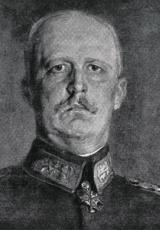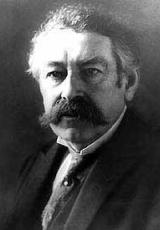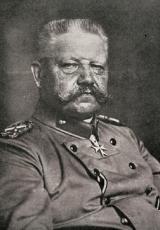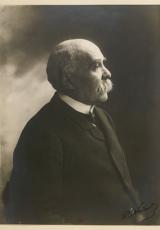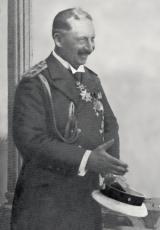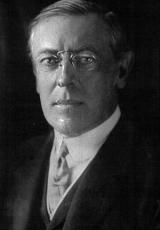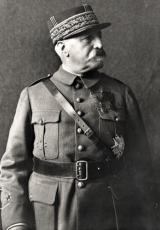L'assaut final

Corps 1
The final assault Marshal Foch's hammer blows By the beginning of August, there was a reversal of the military position on the Western front: the German armies had certainly lined up over 200 divisions, but the best of them had been exhausted in the spring offensives, whilst the American army, which was growing to the tune of 250,000 men a month, now consisted of more than 1,200,000 soldiers, of whom about a million were engaged in fighting.
Corps 2
The plan of General Foch, who had been promoted to the position of Marshal at the beginning of August, consisted firstly of clearing the railway lines and reducing the pockets and salients created by the carious German offensives. His thinking was that a full-scale offensive could not take place until the end of the year and the definitive decision, the liberation of the country and the complete defeat of the German army, would only come about some time in 1919. The coordination of offensives on all fronts would perhaps speed things up. Foch also wanted the Italians to take the initiative against the Austro-Hungarians, who in June had suffered a serious setback along the Piave River. But General Diaz, still reeling from the Caporetto disaster of October 1917, refused to engage his trans-alpine troops prematurely.
On the French front, it was in Picardy that the allies struck the first blow at the beginning of August and then, after a pause, the offensive was taken up again at the end of the month on the Picardy plateau. On the 2nd September, Ludendorff had to withdraw the German front, along the Hindenburg line, from the Lys to the Chemin des Dames, losing all the ground he had gained in March. The German Commander in Chief considered the sector lost. The elite troops had effectively conceded defeat, the allied forces advanced and the French assault tanks were to prove themselves formidable in the offensive. From the 12th to the 14th September, a Franco-American attack was to crush the Saint-Mihiel salient in the Meuse region, unblocking the Paris to Avricourt railway line. Foch immediately prepared a large-scale offensive, which began on the 26th September, bringing together all the allied armies from the Western Front over an area of around 350 km. The German regiments, engaged in hand to hand combat and becoming increasingly reduced in numbers, gradually retreated in Artois, Picardy and Lorraine. In Berlin, the political and military authorities knew that the situation was almost hopeless, as many other fronts crumbled.
A succession of Armistices Since the beginning of September, the allied armies had been preparing a wide-scale offensive against Bulgaria along the Eastern front. It began on the 15th and proved to be a great success. On the 24th, the Bulgarian army was cut in two and a cavalry raid on Uskub was threatening the enemy's rearguard. Two days later, General Franchet d'Esperey received an armistice request from Sofia. Bulgaria was the first member of the Quadruplice to surrender under allied pressure. It is true that the country's morale was not really lifted, due to supply problems and, especially because of German reticence towards Bulgarian demands over certain Romanian areas. Through the treaty of Bucharest, Romania had been quite well looked after by Germany and Austro-Hungary in order to create a certain amount of bitterness on Sofia's part. The armistice conditions (immediate withdrawal from Serbian and Greek territory, demobilisation of the army, occupation by the Allies of strategic points in the country etc.) helped the armies of the Entente to threaten the Danube valley and Austria directly and to isolate Turkey. This was first victorious armistice for the allies and true revenge for those in favour of the "soft belly" and "peripheral strategy" argument, of which Briand was the principal supporter.
In fact, on the 28th September, Hindenburg and Ludendorff decided that the military situation could no longer allow the struggle to continue. The following day, a conference was called for the political and military authorities of the Reich in Spa. Trusting the declarations made by the military, Wilhelm II and Chancellor Hertling approved an armistice request to the Allies on the basis of Wilson's Fourteen Point Plan. But in order to do this, it was necessary to change the Berlin government, as the American President had stated several times that he did not want to negotiate with the established authority in Germany. Accepting Hertling's resignation, Wilhelm II and his government elected Prince Max de Bade the new Chancellor, his reputation as a liberal allowing him to gain a majority in the Reichstag and his rank of prince safeguarding the image of the dynasty. At the beginning of October, he brought about the constitutional reform of the Reich, whilst trying to negotiate the basis of the Fourteen Points with Wilson. In the middle of the month, the German government had to face facts: the USA would not negotiate peace with the current dynasty in power. Moreover, the military situation was getting worse day by day, the German armies were retreating and the front was now established along a line from Tournai to Valenciennes, Guise, Rethel and the Meuse valley. At the end of October, the government accepted the radical changes demanded by Wilson. But Wilhelm II refused to abdicate, supported by military leaders, including Ludendorff's successor, General Groener. At the beginning of November, it was the country's domestic situation that was to worsen. On the 3rd, a revolutionary style mutiny erupted in the fleet and rapidly spread. The defection of Germany's allies put the Bavarian region within enemy reach.
In Palestine, the British General Allenby, having taken the offensive in mid-September, was occupying the Arab countries and had forced the Ottoman army to retreat to Aleppo. The Bulgarian collapse, which left Constantinople exposed, led to the resignation of the "Young Turks" government at the beginning of October. The new government immediately entered into negotiations with Great Britain alone: on the 31st the armistice was signed and ratified by France, who, despite her protests to her ally, had not taken part in the negotiations.
The situation was hardly any better within the Austro-Hungarian Empire. Having been undermined for a long time by separatist movements, the dual monarchy gradually disintegrated. Since the beginning of the month, the Poles, Czechoslovaks and Serbo-Croats had openly expressed their desire for independence. In addition, the Allies had generally encouraged the separatists, having recognised Czechoslovakia since the spring and Poland in the autumn. Since the USA had recognised Czechoslovakia at the beginning of September, it was no longer possible for Vienna to negotiate on the basis of the Fourteen Points. These allowed only for "autonomy" of the nations of the empire. By raising the bar, Wilson was condemning the dual monarchy. On the 24th October, a year and a day after Caporetto, Italy launched her offensive along the Piave. Her troops breached the front, securing victory at Vittorio-Veneto. The Austrian army was no longer capable of resisting; whole regiments of Hungarians, Poles and Czechs refused to fight, since they were certain of gaining their independence within a few weeks. Faced with a military situation just as serious as the political situation, Emperor Charles signed the armistice with Italy on the 3rd November and then left the country as the Republic was declared.
In Berlin, it was no longer a question of whether it was possible to avoid defeat, but whether the Reich could still avoid a revolution. The majority of the government had agreed to sacrifice the imperial throne, but Wilhelm II refused, certain that the army would defend the regime. On the 7th November, German delegates were sent to Marshal Foch to receive the conditions of the armistice. In Berlin, revolution had broken out; regiments formed soldiers' councils and workers were on strike. In the morning, forcing the hand of the Emperor, Max de Bade announced his relinquishment of the throne. At 2 pm the socialist Scheidemann declared the Republic, whilst a government was formed, headed by the socialist Ebert. On the 9th November, revolutionary rioting and a general strike broke out in Berlin. The same day, the Emperor abdicated and went to Holland. Furthermore, on the allied front, Pétain was amassing a strong army in Lorraine under the command of Castelnau, for an offensive into the heart of the enemy operation towards Metz. Scheduled for the 14th November, it was to cause the collapse of the German front, by taking the war onto the Reich's territory. This shows that the armistice was not expected before 1919.



